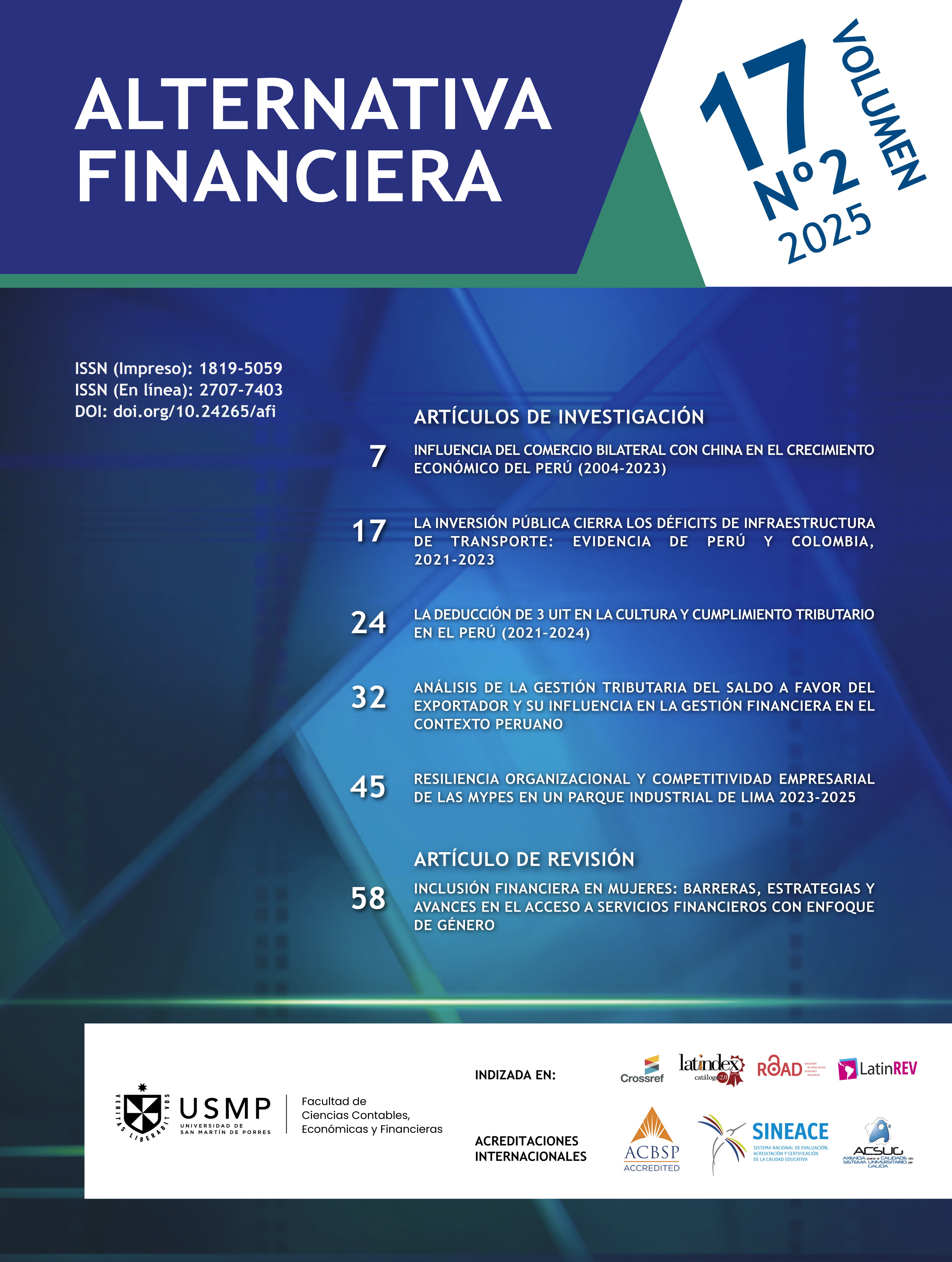FINANCIAL INCLUSION FOR WOMEN: BARRIERS, STRATEGIES, AND PROGRESS IN ACCESSING FINANCIAL SERVICES WITH A GENDER PERSPECTIVE
DOI:
https://doi.org/10.24265/afi.2025.v17n2.06Keywords:
finance, financial inclusion, gender, financial technologies, economic empowermentAbstract
Financial inclusion is defined as the effective access and responsible use of financial products and services that help individuals and businesses meet basic needs and strengthen their
economic well-being. This concept has gained global relevance due to its relationship with poverty reduction and the promotion of gender equality, although significant gaps persist
that restrict women’s full participation. These inequalities reflect historical patterns of exclusion that hinder the social and economic development of communities. This study
aimed to identify factors, strategies, technologies, and regulatory frameworks that impact women’s financial inclusion through a systematic review of recent literature. To this end, the PRISMA 2020 methodology was applied, which establishes an orderly and rigorous process to ensure transparency and robustness in the synthesis of evidence. The resulting
reflection allows us to recognize that financial inclusion is a dynamic process that demands
comprehensive approaches, coordination between actors, and interventions sensitive to local contexts. Consolidating sustainable progress requires revising traditional models and
investing in capacities that promote women’s economic autonomy.
Downloads
References
Abdullahi, A. S., Ladan, A., Yusuf, A., & Salisu, M. (2025). Financial technology and financial inclusion: The role of financial
literacy. International Journal of Financial Research and Business Development.
Adegbite, O. O., & Machethe, C. L. (2020). Bridging the financial inclusion gender gap in smallholder agriculture in Nigeria: An untapped potential for sustainable development. World development, 127, 104755.
Adelaja, A. O., Umeorah, S. C., Abikoye, B. E., & Nezianya, M. C. (2024). Advancing financial inclusion through fintech:
Solutions for unbanked and underbanked populations. World Journal of Advanced Research and Reviews, 23(01), 427-438.
Adera, A., & Abdisa, L. T. (2023). Financial inclusion and women’s economic empowerment: Evidence from Ethiopia. Cogent Economics & Finance, 11(2), 2244864.
Agbeve, V., Adukpo, T. K., Mensah, N., Appiah, D., & Atisu, J. C. (2025). Comparative analysis of digital banking and financial inclusion in the United States: Opportunities, challenges and policy implications. Asian Journal of Economics,
Business and Accounting, 25(3), 452-467.
Antonijević, M., Ljumović, I., & Ivanović, Đ. (2022). Is there a gender gap in financial inclusion worldwide?. Journal of Women’s Entrepreneurship and Education, (1-2), 79-96.
Aslan, G. (2022). Enhancing youth and women’s financial inclusion in South Asia. Cogent Economics & Finance, 10(1), 2136237.
Assaf, A. A. M. (2024). Impact of Social Entrepreneurship on Women Empowerment through Financial Inclusion an Analytical Study from the Kingdom of Saudi Arabi. Pakistan Journal of Life & Social Sciences, 22(1).
Asubiaro, T., Onaolapo, S., & Mills, D. (2024). Regional disparities in Web of Science and Scopus journal coverage. Scientometrics, 129(3), 1469-1491. https://doi.org/10.1007/s11192-024-04948-x
Bello, O. A. (2024). The role of data analytics in enhancing financial inclusion in emerging economies. International Journal of Developing and Emerging Economies, 11(3), 90-112.
Bhatia, S., & Singh, S. (2019). Empowering women through financial inclusion: A study of urban slum. Vikalpa, 44(4), 182-197.
Binsuwadan, J., Elhaj, M., Bousrih, J., Mabrouk, F., & Alofaysan, H. (2024). The Relationship between Financial Inclusion and Women’s Financial Worries: Evidence from Saudi Arabia. Sustainability, 16(19), 8317.
Del Sarto, N., & Ozili, P. K. (2025). FinTech and financial inclusion in emerging markets: a bibliometric analysis and future research agenda. International Journal of Emerging Markets, 20(13), 270-290.
Eckhoff, S., Kibombo, G. M., Natukunda, M. M., Pennotti, C., & Vandergaag, K. (2019). What works to increase financial inclusion and women’s financial autonomy? Intentional designs showing promise. Development in Practice, 29(8), 974-987.
Elouardighi, I., & Oubejja, K. (2023). Can digital financial inclusion promote women’s labor force participation?
Microlevel evidence from Africa. International Journal of Financial Studies, 11(3), 87.
Fowowe, B. (2025). Financial inclusion, gender gaps and agricultural productivity in Mali. Review of Development Economics, 29(1), 3-42.
García Moritán, M. (2020). Financial inclusion for MSMEs and women’s economic empowerment. Journal of the international Council for Small Business, 1(1), 7-9.
Ghosh, S. (2022). Political empowerment of women and financial inclusion: Is there a link?. Social Sciences & Humanities Open, 5(1), 100267.
Hendriks, S. (2019). The role of financial inclusion in driving women’s economic empowerment. Development in Practice, 29(8), 1029-1038.
Hundie, S. K., & Tulu, D. T. (2023). Determinants of financial inclusion gender gap in Ethiopia: Evidence from decomposition analysis. Cogent Business & Management, 10(2), 2238124.
Johnen, C., & Mußhoff, O. (2023). Digital credit and the gender gap in financial inclusion: Empirical evidence from Kenya. Journal of International Development, 35(2), 272-295.
Kalpana, K. (2015). Economic Entitlements via Entrepreneurial Conduct? Women and Financial Inclusion in Neo-liberal India. Journal of World-Systems Research, 50-68.
Kim, K. (2022). Assessing the impact of mobile money on improving the financial inclusion of Nairobi women. Journal of Gender Studies, 31(3), 306-322.
Le Quoc, D. (2024). The relationship between digital financial inclusion, gender inequality, and economic growth: dynamics from financial development. Journal of Business and Socio Economic Development, 4(4), 370-388.
Mabrouk, F., Bousrih, J., Elhaj, M., Binsuwadan, J., & Alofaysan, H. (2023). Empowering women through digital financial inclusion: Comparative study before and after COVID-19. Sustainability, 15(12), 9154.
Manta, A. (2019). Financial inclusion and gender barriers for rural women. International Journal of Management, 0(5).
Martínez-Rodríguez, S., & Lopez-Gomez, L. (2023). Gender differential and financial inclusion: Women shareholders of Banco Hispano Americano in Spain (1922–35). Feminist Economics, 29(3), 225-252.
Mishra, D. K., Malik, S., Chitnis, A., Paul, D., & Dash, S. S. (2021). Factors contributing to financial literacy and financial inclusion among women in Indian SHG. Universal Journal of Accounting and Finance, 9(4), 810-819.
Mishra, D., Kandpal, V., Agarwal, N., & Srivastava, B. (2024). Financial inclusion and its ripple effects on socio-economic
development: a comprehensive review. Journal of Risk and Financial Management, 17(3), 105.
Nguse, T., Desalegn, G., Oshora, B., Tangl, A., Nathan, R. J., & Fekete-Farkasne, M. (2022). Enhancing women economic
empowerment through financial inclusion: Evidence from SMEs in Ethiopia. Polish Journal of Management Studies, 25.
Page, M. J., McKenzie, J. E., Bossuyt, P. M., Boutron, I., Hoffmann, T. C., Mulrow, C. D., ... & Moher, D. (2021). The PRISMA 2020 statement: an updated guideline for reporting systematic reviews. bmj, 372. https://doi.org/10.1136/bmj.n71
Raheem, S., Addo, A., Shaffakat, S., & Lunberry, D. (2024). Designing for financial inclusion in developing countries: Digital financial service for low-income women in Ghana. The Information Society, 40(5), 376-394.
Rani, V. S., & Sundaram, N. (2023). Impact of financial inclusion on women entrepreneurs in India: An empirical study. International Journal of Professional Business Review: Int. J. Prof. Bus. Rev., 8(6), 24.
Sakyi-Nyarko, C., Ahmad, A. H., & Green, C. J. (2022). The gender-differential effect of financial inclusion on household financial resilience. The Journal of Development Studies, 58(4), 692-712.
Shehadeh, M., Dawood, H. M., & Hussainey, K. (2025). Digital financial literacy and usage of cashless payments in Jordan: the moderating role of gender. International Journal of Accounting & Information Management, 33(2), 354-382.
Sherwani, F. K., Shaikh, S. Z., Behal, S., & Siddiqui, M. S. (2024). Determinants of financial inclusion among women-owned enterprises: a case study of the informal sector. Arab Gulf Journal of Scientific Research, 42(4), 1340-1358.
Showkat, M., Nagina, R., Baba, M. A., & Yahya, A. T. (2025). The impact of financial literacy on women’s economic empowerment: exploring the mediating role of digital financial services. Cogent Economics & Finance, 13(1), 2440444.
Showkat, M., Nagina, R., Nori, U., Baba, M. A., & Shah, M. A. (2024). Empowering women in the digital age: can digital financial services fulfil the promise of financial autonomy and gender equality in the attainment of Sustainable Development Goal 5?. Cogent Economics & Finance, 12(1), 2342459.
Tripathi, S., & Rajeev, M. (2023). Gender inclusive development through Fintech: Studying gender-based digital financial inclusion in a cross-country setting. Sustainability, 15(13), 10253.
Vasile, V., Panait, M., & Apostu, S. A. (2021). Financial inclusion paradigm shift in the postpandemic period. digital-divide and gender gap. International journal of environmental research and public health, 18(20), 10938.
Velmurugan, R., Sudarvel, J., Jothi, K., & Thirumalaisamy, R. (2025). The Role of Women’s Entrepreneurship in Rural
Development. In Empowering Women Through Rural Sustainable Development and Entrepreneurship (pp. 357-378). IGI Global Scientific Publishing.
Widyastuti, U., Respati, D. K., & Mahfirah, T. F. (2024). Digital financial literacy and digital financial inclusion: A multigroup analysis based on gender. Humanities and Social Sciences Letters, 12(1), 33-42.
Yeyouomo, A. K., Asongu, S. A., & Agyemang Mintah, P. (2023, March). Fintechs and the financial inclusion gender gap in Sub Saharan African countries. In Women’s studies international forum (Vol. 97, p. 102695). Pergamon.
Zelu, B. A., Iranzo, S., & Perez-Laborda, A. (2024). Financial inclusion and women economic empowerment in Ghana.
Emerging Markets Review, 62, 101190.
Downloads
Published
Issue
Section
License
Copyright (c) 2025 Mauricio Bouroncle Velásquez, Ada Gallegos, Carlos Flores Goycochea, Jackeline Valencia, Paula Andrea Rodríguez-Correa

This work is licensed under a Creative Commons Attribution-NonCommercial-ShareAlike 4.0 International License.
Creative Commons Atribución-NoComercial-CompartirIgual 4.0 Internacional (CC BY-NC-SA 4.0). Faculta a los usuarios a compartir: copiar y redistribuir el material en cualquier medio o formato y adaptar: remezclar, transformar y desarrollar el material, siempre y cuando se acredite al autor original, no se utilice con propósitos comerciales y las nuevas creaciones se licencien bajo los mismos términos de esta licencia.













